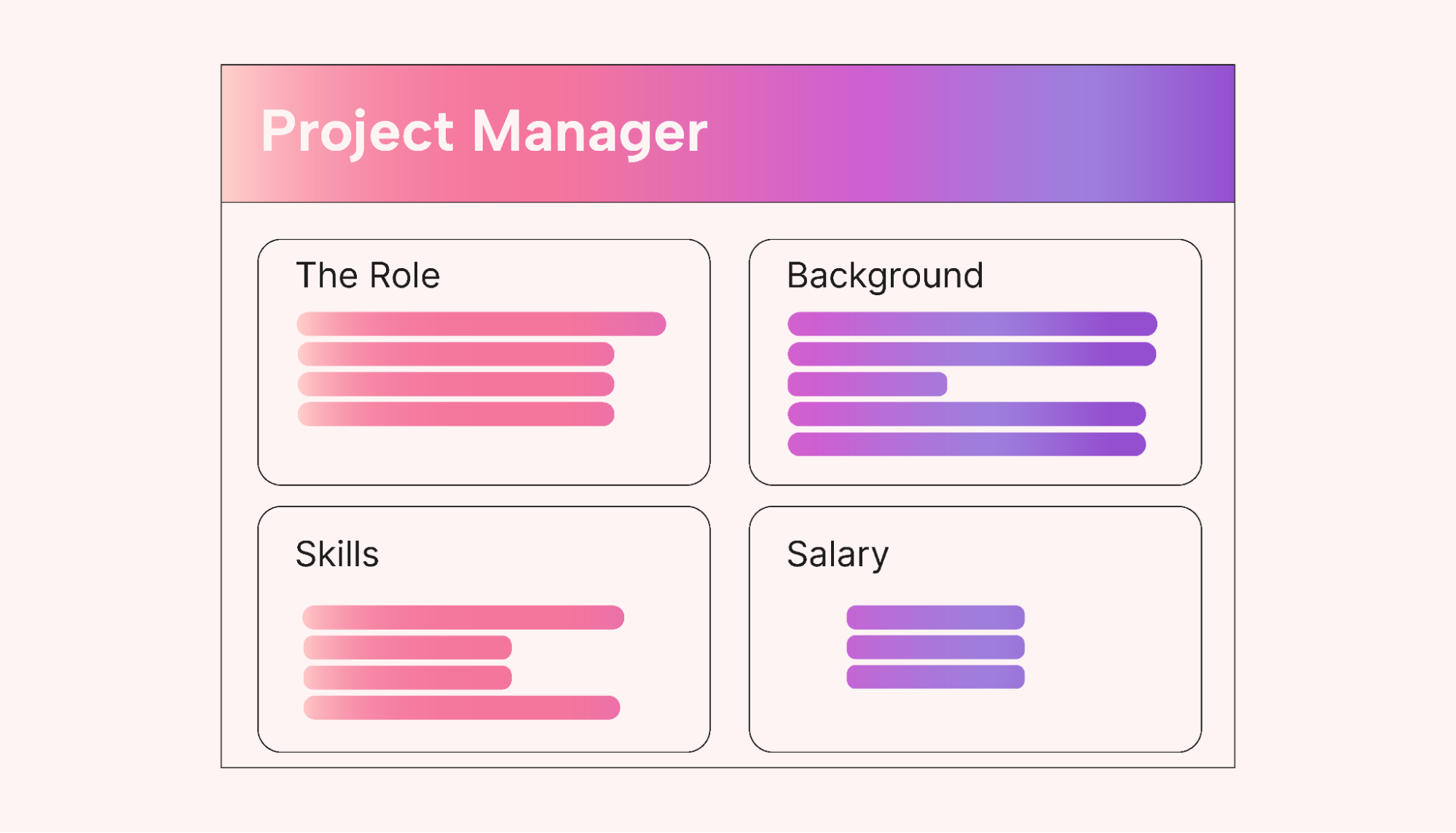Projects can be stressful. They require a large investment of your time and money, so it's critical that the outcome is positive for your business.
You know who knows all about this? Project managers.
Anyone can learn the responsibilities and skills needed to manage a project. But by learning a few tricks from a project management professional, you might be able to take your project from start to finish without hiring one.
This article will share everything you need to know about project manager responsibilities. You'll even get some tips from professionals. Read on to find out how to manage a project like a pro, no matter how small your company is.
What exactly is a project manager?
Project managers are individuals tasked with planning and executing a project.
That sounds pretty simple, right?
The truth is that there are many moving parts, and they’re responsible for both the 10,000-foot view of the project and the smallest details.
 |
The Project Management Institute (PMI) estimates there are 16.5 million project managers in the United States and Canada. It's also believed that over 70% of companies have a project manager on staff and in the office. Career opportunities are on the rise for this profession.
Responsibilities of a project manager
If you're wondering if you have what it takes to tackle a project as the project manager, there's no need to worry. Understanding the responsibilities is the first step to getting it all done.
 |
These responsibilities will vary from project to project. While you may not need to be an expert in these skills, you should at least understand them. It's also important to note that this list may not include everything you’ll be doing.
As a small business owner or “accidental project manager,” you might have to wear all these hats (and learn as you go)!
Information gathering
In this phase, the project manager is tasked with determining the project's main goal, scope, and internal and external stakeholders. During this stage, the project manager will gather as much background as possible on the following topics.:
- What are the project goals and project objectives?
- What is the project scope?
- What determines the success of this project?
- Has anything similar been done before, and if so, what were the takeaways from that project?
- Are there specific criteria that need to be met?
- What assumptions is your business making?
- What is the timeline?
- What is the budget for the project?
- Why is this project important to your business?
Example: Let's examine Mike's home lawn care company. He wants to buy more equipment and add another project team to expand his customer base. During the information-gathering piece of this project, he'll need to determine:
- The cost of the additional equipment.
- The cost of the additional staff.
- How many potential clients he could reach, and the potential profits.
Planning
This phase is about organizational skills, where you'll put together a detailed project plan outlining critical project pieces like risks, costs, scope, and timeline. You should also start considering who your internal and external stakeholders are in your project plan and how to engage and manage them.
Project planning isn't limited to the start of a project. As risks arise and circumstances change, you'll have to replan accordingly. This will occur throughout the project lifecycle.
The "pre-mortem" of a project is critical to understanding possible outcomes and risks before the project begins. This will save you time and money once the project has begun.
Monitoring and controlling
Overall project examination and course corrections occur (repeatedly) during this stage. Effective project managers use shared calendars and dashboards in project management software to track everything in the project life cycle, from tasks to budgets.
For example, if you are making a new toy and you find out that a component is now back-ordered, you’ll need to either readjust your timeline or find a new component. Project management software like Motion will allow you (and your team) to see what and where pivots are necessary and how they affect other project pieces.
Fiscal
Project managers are responsible for ensuring funding for a project is in place before costs begin piling up.
Tracking the budget and costs of a project is essential. You need to make sure the project is on track, and funds will be available throughout the project lifecycle.
Most project management software has a financial component to it. This allows you to determine where resources are being used and where they could be better allocated.
If funds are being procured from lenders or through venture capital, you must ensure those funds are available by the time invoices need to be paid. Let's say a hairdresser is looking to open a second salon. Funding will be needed (in cold, hard cash) to procure the second location, inventory, staffing, and equipment, such as chairs.
Scheduling
Project management means using all resources as effectively as possible.
For deliveries, staffing needs, meetings, and product releases, proper scheduling and time management are critical. Understanding dependencies is important for ensuring tasks are scheduled in the proper order.
 |
Note that, like many other pieces of a project, the project timeline may have to be adjusted during the project. The project manager makes those adjustments as necessary and notifies everyone impacted.
Executing
This is the step that most people envision when they hear the words project manager.
The execution phase is the lengthiest and the most complex. It's when all the wheels are moving.
During this phase, you need to ensure goals are being met, staff are staying on task, and solving issues that pop up.
While you may not be executing the project yourself, you'll be responsible for ensuring all the pieces are chugging along as planned. This includes tracking costs, inventory, and available resources and comparing them to the plan.
Communicating
Architecting collaboration is arguably the most important aspect of project management. This means removing all barriers, workspace, cultural and functional, that impede communication.
As the adage goes, you can't communicate enough. You'll need to communicate with all parties involved in your project (constantly), including the project team and key stakeholders such as lenders, vendors, and end consumers.
A messaging app or software will allow you to create channels to discuss your project components with the applicable groups.
For example, all staff members setting up your new warehouse would be on one channel, investors on the other, and management on a third.
Using a communication tool that allows you to search for keywords is also helpful to locate information quickly.
Closing the project
During this phase, third-party vendors are evaluated, invoices are paid, and contracts are closed.
Making a written record that future project managers can search for will ensure that lessons learned are passed on and adopted.
Most importantly, a project review, or post-mortem, is done. This is where the project team and internal stakeholders dissect a project (good, bad, and ugly) for lessons learned.
Even the smallest business should take the time to close out a project and record what was learned during its course. Failures can provide valuable lessons that can help avoid mistakes in future projects.
Skills to become a project manager
The essential skills for project management can be gained through education. However, having a mentor and on-the-job experience can teach many of these project management skills.
Communication
A successful project manager must be able to communicate at all levels of an organization (and with customers) effectively. Being able to discuss the project and its components with all involved will ensure that all parties understand their role, deadlines, and requirements. A project manager must often collaborate with upper management, outside vendors, and government entities.
Problem-solving
No matter how many risks the project manager has identified ahead of time, surprises will pop up. Knowing how to remain calm, think on your feet, and make quick and effective decisions is a crucial skill in project management.
Motivation and leadership
Although project managers assign tasks to others, without constant follow-up from the project manager, that isn't enough to ensure completion.
A project manager must be willing to work with employees, overcome obstacles, and help with a task when necessary.
A project manager must also understand who can do what. This ensures that tasks go to the person with the best ability to complete them.
Being a good leader (and motivator) will also help you create high-performing project teams more effectively.
Tips from project management pros
We've gathered some tips and tricks the pros use to help you with your project management.
Avoid multitasking
While multitasking sounds like it'll lead to increased productivity, it's been found that it can decrease productivity by up to 40%, according to the American Psychological Foundation. Staying on task and focused will increase the amount you get done and reduce unforced errors.
Pay attention to morale
Tackling a large project within the confines of a small business can be taxing and stressful. Everyone is expected to play a role and work towards a common goal during a time when employees may be asked to perform duties outside of their everyday responsibilities. This can lead to burnout quickly.
Respond to what employees say and discuss ways to decompress and increase motivation. If bringing in new employees, take the time to get to know them (and help your team do the same).
Collaboration and communication do wonders for team morale.
Manage risks
It's essential to identify and manage potential project risks. Think of the time spent as an investment in the future success of the project.
By anticipating and preparing for risks, you can avoid costly emergent issues throughout the project lifecycle. Managing risks means understanding where they may occur and having a plan to deal with them if they pop up.
For example, your company hopes to ship a new product in time for the holidays. During your risk assessment, you identify transportation as a risk. Transportation is more challenging to acquire and more expensive during the holiday season. By proactively identifying this risk ahead of time, your company then locks in a competitive shipping rate months in advance of the holiday rush.
Use project management software
Project management software is the assistant you wish you had.
Project management tools are like a Swiss army knife, able to do a lot in one system: tasks, schedules, calendars, and analysis.
By using centralized project management software, you can save valuable time and increase productivity. For example, with in-app communication features, you can seriously boost collaboration. Or the software can automatically generate your weekly status report.
 |
It gets even better with an AI-powered tool.
Take your project management to the next level
Project managers balance many responsibilities before, during, and after a project.
But it's easy to get bogged down in the nitty-gritty of those responsibilities. Motion collects those details for you and keeps them in one place. This means you don't have to worry about your to-do list, project calendar, documents, or tracking the work. It's all there at your fingertips.
Take a load off with. Try Motion with a free trial.





